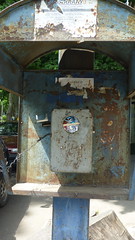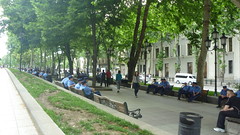 The tall blonde blue-suited airport security worker keeps looking down at his screen and up at my face in suspicion, “So you work for who?” I try to explain my different jobs as a citizen journalist, but he only seems to listen to half of what I say. From the very first question he has shot me looks of disapproval, of my job, of my nationalities, of my travel habits… to him there is something wrong with me. He goes on to ask what I find to be excessively personal questions about who my friends are and who I live with, which I politely refuse to answer. He calls over another man who is near the gate, watching all the pre-boarding interviews for passengers on their way to the US. This man, obviously a supervisor, looks at me, looks at his paper, and starts writing me up for a “full” security check. As the two men start to take me away from the gate the supervisor says “Sir, you’ll have to go for further security checks, your life is just too complicated for us.”
The tall blonde blue-suited airport security worker keeps looking down at his screen and up at my face in suspicion, “So you work for who?” I try to explain my different jobs as a citizen journalist, but he only seems to listen to half of what I say. From the very first question he has shot me looks of disapproval, of my job, of my nationalities, of my travel habits… to him there is something wrong with me. He goes on to ask what I find to be excessively personal questions about who my friends are and who I live with, which I politely refuse to answer. He calls over another man who is near the gate, watching all the pre-boarding interviews for passengers on their way to the US. This man, obviously a supervisor, looks at me, looks at his paper, and starts writing me up for a “full” security check. As the two men start to take me away from the gate the supervisor says “Sir, you’ll have to go for further security checks, your life is just too complicated for us.”
His words, and their faces, as a large part of my life lay before them, reminded me of a simple truth: I walk a different path, A very different path. And that path doesn’t fit easily into the boxes on a form, as so much of our lives are supposed to. When you don’t walk the familiar line, give the typical answers, you’re more often condemned then welcomed.
That’s not to say my path is miserable burden. I didn’t mean to lead you in that direction. Indeed I what I do brings me a great deal of joy and wonder, and yes, I would even say more appreciation then rejection.
Still there I am, heading to the basement of Schiphol airport to have every inch of my body and belongings searched. What are these strangers who barely look me in the eye searching for? Any easy way to understand my life perhaps? Something that makes sense to them, perhaps? Whatever it is, I’m not sure they ever find it. Some may get it, some may learn, adapt, and recognize something they never understood before. A different way of doing things that has value, in some form of another. Then again, some people never learn anything. The world goes on repeating some mistakes over and over, and the innocent suffer.
As the great street philosopher and drug dealer Poot once explained, “World going one way, people another yo.”


